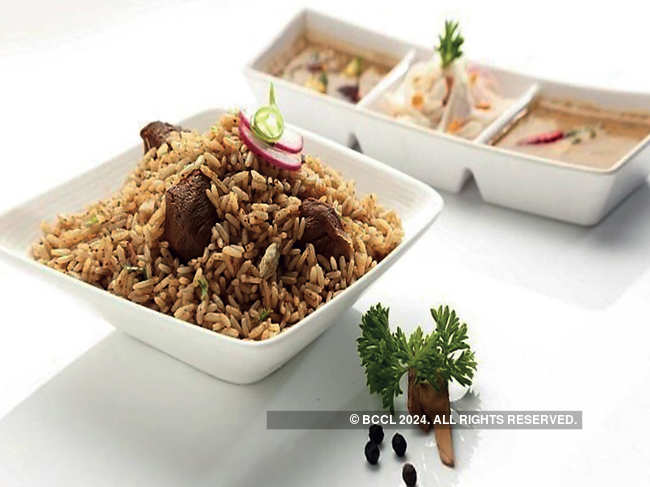
But Dindigul Thalappakatti, the Chennai-based biryani chain, which has just raised Rs 260 crores from private equity firm CX Partners to help it go national, shows how it can help cook up a winning strategy.
The case began in 2005 when Thalapakatti filed a suit against Rawther Thalapakattu Biryani for infringing on its name and turban logo. Thalapakkati argued that this was the legacy of its founder, D Nagasamy Naidu from Dindigul, who always wore a turban (‘thalaipakkai’ in Tamil) in the style of poet Subramanya Bharathi.
Naidu ran a betel-nut stall, but his wife was famous for her mutton biryani and in 1957 he opened an eatery to serve it. This slowly expanded across the state and in time the turban name, which had been used informally, was adopted as the brand name along with a logo showing Naidu and his turban.
The opponents countered that they traced their roots to a Sulaiman, who was chief of the Horse Regiment of the Raja of Sivaganga. He was from the Rawther community, which originated with Persian horse traders who came to South India and married local women. Perhaps because of the Middle Eastern links they were known for their biryani, and also a tradition of wearing turbans, one of which now appeared in stylised form in their logo.
 Getty Images
Getty ImagesThe case finally came down emphatically on the Dindigul side in 2013. Justice Prabha Sridevan, chairperson of the Intellectual Property Appellate Board, noted the substantial historical documentation from the Dindigul side, and while she agreed that the opponent’s ancestor might have worn a turban “it is very difficult to accept that the respondent did not know about the Biryani Hotel in Dindigul.”
Because the case involved biryani, it was very well-reported on in Tamil Nadu. As Justice Sridevan noted in her ruling: “Biryani is enjoyed by consumers from all classes and from all economic strata and also by people both literate and illiterate.” Her point was that just changing the last letter in the spelling of Thalapakatti wasn’t sufficient difference. But it was also excellent publicity for the Dindigul side, with all the documentation helping to establish their authenticity.
What the case didn’t do was close off competition. Dindigul Thalapakatti now has 62 outlets, including seven abroad, but Chennai Rawther Biryani can also be found very widely, along with many other biryani outlets. A standard morning sight on streets in Tamil Nadu is the large vessels for biryani being washed, before they are filled and fired up again for the day. And despite their 2013 win, Dindigul Thalapakkati has had to deal with new cases, like one against Star Thalapakkati Briyani, which it got a restraining order against from the Madras High Court in May this year.
Tamil Nadu’s love for biryani probably stems from the state’s love of rice. Despite inroads made by rotis and bread in South India, rice remains the favourite by far. But biryani in particular got a boost from the state’s Dravidian political movement, with all its emphasis on mass rallies and shows of support. It is well understood that supporters must be fed, and what better way to do it than biryani, which not only benefits from being cooked in large quantities, which means less labour, but is also an almost complete meal.
While vegetarian biryani is also made, what’s mostly served up is non-vegetarian and this fits the Dravidian movement’s emphasis on meat as a way to oppose vegetarian Brahmin influence. The journalist Venkatesan Vembu tells the story of how Mani Shankar Aiyar managed to avoid this trap in the 1991 elections, by declaring himself a ‘meat-eating Brahmin’ and challenged his opponent in the Mayiladuthurai constituency to a chicken biryani eating contest. Whether or not because of the biryani, Aiyar won the election.
This link between biryani and elections is not new nor restricted to Tamil Nadu. In 1919, during the elections for the Bombay Municipal Corporation, The Times of India (ToI) reported on how “a number of Mahomedan candidates had made arrangements for the creature comforts of their supporters and ‘pullav’ and ‘biriani’ were served out on a liberal scale.” By 1936 though this was being seen as controversial, with one candidate, Shamdasani, taking another, Alarakhia Aba Alaiza Seth, to court because, the newspaper reported, “he saw biryani being prepared in large utensils outside the candidate’s tent, which attracted the voters”.
Politicians would counter, in subsequent decades, by saying the biryani was meant for its party workers. In 2004, ToI reported that the Shiv Sena, which had always fed its workers on impeccably local puri-bhaji and vadapav, was now upgrading to biryani: “Ravindra Waikar, the Sena candidate from Andheri, had given contracts to as many as four caterers to ensure that supplies of vegetarian, chicken and mutton biryani didn’t fall short.” There is a story of the Sena leader Manohar Joshi instructing party workers on how to educate voters about correctly pressing buttons in the new voting machines. As the professorial Joshi droned on, people got restive and finally started calling out for “less button, what about the mutton?”
It is easy to see how lucrative contracts for biryani supply for rallies would have helped many caterers come up. And for the consumers of biryani, too, it would have gained status as a special food, which they could order too, for special occasions, or just when they wanted a treat. Perhaps this formula helped persuade the private equity investors in Thalapakatti: in a country where elections are so frequent, surely the demand for biryani can only grow as it did in Tamil Nadu? ..













 Get Unlimited Access to The Economic Times
Get Unlimited Access to The Economic Times
